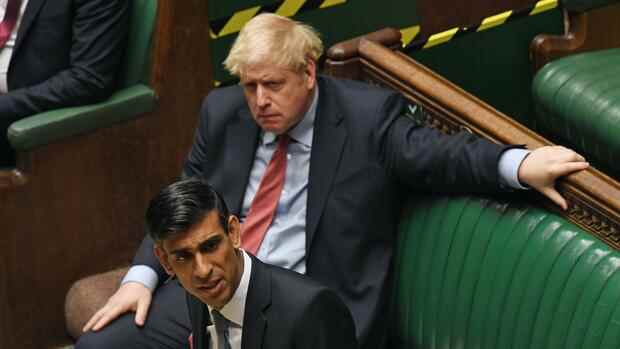The British are confronted with sharply rising living costs, the pressure on politicians is growing.
(Photo: via REUTERS)
Berlin The bad news for British Chancellor of the Exchequer Rishi Sunak came before breakfast: consumer prices rose by 6.2 percent in February compared to the previous year. This is the biggest surge in inflation Britain has seen in the past 30 years.
Even before his budget speech in the House of Commons on Wednesday afternoon, the conservative finance minister was under increasing pressure to open up his painstakingly consolidated treasury and rush to help the British, who are groaning under the soaring cost of living.
Sunak blamed the aftermath of the pandemic and the economic consequences of the war in Ukraine for the price explosion. “The sanctions are not in vain,” he said, emphasizing that “people should know that we stand behind them”. The Chancellor of the Exchequer announced a mix of tax cuts and direct financial aid for low-income families.
By March 2023, UK fuel tax will be reduced by five pence per liter of petrol. Homeowners no longer have to pay VAT for energy-saving purchases or conversions. The European Court of Justice restricted this possibility in 2019.
Top jobs of the day
Find the best jobs now and
be notified by email.
Thanks to Brexit, you now have a free hand, said Sunak to thunderous applause from his Tory group. In fact, the ECJ at the time objected to the British plans for violating EU law.
Election gifts are being prepared
However, the Chancellor of the Exchequer did not stop at emergency aid, but announced further tax breaks. The aim is to raise the income limit above which income tax and social security contributions have to be paid. However, this relief of a total of six billion pounds is overshadowed by the fact that Sunak wants to increase national social security contributions unchanged by 1.25 percentage points. The additional income of around twelve billion pounds should benefit the state health system.
Sunak wants to improve the depreciation options for investments in research and development by the fall in order to boost productivity. Small businesses should also benefit from higher tax allowances. And by the end of the 2024 legislative period, Sunak intends to keep his promise to reduce the basic income tax rate from 20 to 19 percent. Cost point: five billion pounds. That should be a first foretaste of further tax breaks before the next elections.
The pressure from his own party to relieve the burden on the people remains high, but Britain is heading for the highest tax burden in 70 years. The bottom line is that the net tax cuts announced by Sunak would only offset about a sixth of the previously introduced net tax increases, the Office for Budget Responsibility (OBR) has calculated.
So Sunak has yet to earn his image as the “Chancellor of the Exchequer of Tax Cuts”. Especially since he is repeatedly said to have ambitions for the office of prime minister.
In the past few days, there have been numerous areas of friction between Prime Minister Boris Johnson and his Chancellor of the Exchequer. Johnson, who was ailing after the “Partygate”, not only urged his ambitious treasurer to provide generous financial aid for the British, who are suffering particularly from the high energy and food costs.
In view of the Russian aggression, the Prime Minister also demanded more money for defense and promised a rapid expansion of nuclear energy. The share of nuclear power in the electricity supply is to increase from the current 16 percent to a quarter by 2050.
UK growth slows
The plans of the Chancellor of the Exchequer are also made more difficult by the deteriorating economic situation. According to the OBR, growth is expected to decline from 3.8 percent this year to 1.8 percent in 2023.
The OBR expects an average inflation rate of 7.4 percent this year. In the coming months, according to economists’ forecasts, the rate of price increases could even be in the double digits. One reason for this is that energy prices will rise again by around 50 percent in April when the government has to adjust its price cap to the changed market situation.
The OBR does not expect the inflation rate to fall to around four percent until next year. In addition, there is a mountain of debt currently amounting to more than 95 percent of gross domestic product.
Nevertheless, Sunak sees scope for tax cuts and points to the sharp rise in tax revenue and the decline in new debt. “We can guarantee the people of Great Britain economic security,” promised the Tory minister, but at the same time warned that the situation of public finances could deteriorate significantly again due to geopolitical risks.
Sunak refrained from siphoning off the high profits of the energy companies through a so-called “windfall tax”, as introduced in Italy. “It is evident that the Chancellor of the Exchequer has failed to recognize the magnitude of the challenge,” said opposition Labor Party finance secretary Rachel Reeves.
More on this: Column: How Putin’s War is Turning the World Economy into a Battlefield



